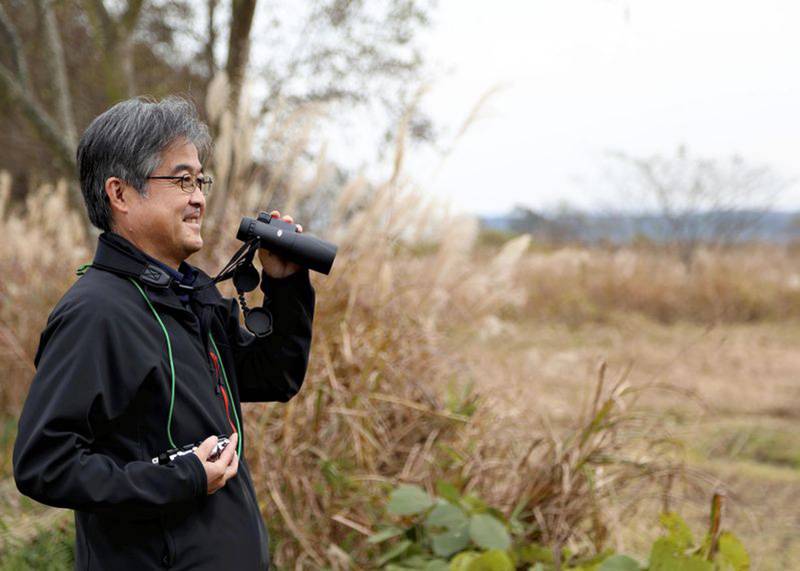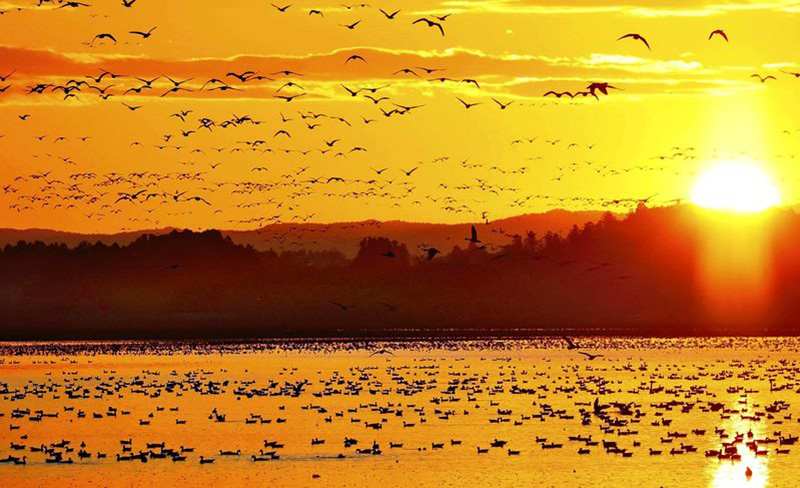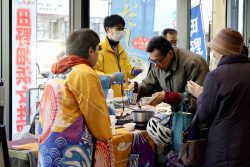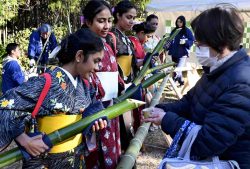
Tetsuo Shimada
15:40 JST, February 8, 2022
SENDAI — Holding a four-digit tally counter with one hand and his binoculars in the other, researcher Tetsuo Shimada tracks the geese, ducks and swans at wetlands in Kurihara. It is 6 a.m., and the sight of more than 100,000 birds simultaneously taking flight in the morning glow is breathtaking.
Shimada observes the birds every day, and said he sometimes feels as though he can see into their minds and communicate with them. “Bird-watching means entering into a dialogue with them,” he said.
In 1994, Shimada assumed a post at the Miyagi Prefectural Izunuma-Uchinuma Environmental Foundation in Kurihara. Izunuma pond and the adjacent Uchinuma pond, which straddle the cities of Tome and Kurihara, Miyagi Prefecture, are nature-rich wetlands and known as one of Japan’s best wintering grounds for various waterfowl.

A flock of greater white-fronted geese takes flight in the early morning at Izunuma pond, which straddle the cities of Tome and Kurihara in Miyagi Prefecture, in November.
A native of Chiba Prefecture, Shimada joined a club while studying at Tokyo University of Agriculture and Technology. He recounts how he was initially attracted by the club’s name, “Noppara no Kai,” which seemed to suggest some kind of outdoor activities, but which turned out to be a nature-observation group for bird lovers.
Upon dabbling in bird-watching, Shimada became fascinated by the creatures’ endearing, human-like gestures and behaviors. He learned a wide variety of birdsong and gathered bird-watching tips from his senior students.
In his third year, Shimada penned a paper on the distribution of ducks on the Tama River. He recalls how he was able to make fresh discoveries, uncovering new things about even familiar birds. Through his research activities, Shimada felt “the joy of adding something akin to a thin sheet of paper” to the accumulated studies of his predecessors.
While a graduate student at Toho University, he participated in a research project in eastern Russia and fell under the spell of the area’s expansive natural environment.
After settling on Izunuma pond as his research field, Shimada’s first purchase was a practical, mamachari-style bicycle. Once a week, he wakes early and rides around the wetlands’ periphery — a journey of about 20 kilometers. After two years, he said he has a pretty good idea of the distribution of plants and animals in the area.
During the course of his observations, Shimada’s interest was piqued when he noticed that swans which usually swam in the swamps occasionally grouped together in rice paddies. Upon observing the same behavior a few years later, he had a revelation: The swans were eating rice the day after heavy rain, and had moved to the paddies because they could not reach the lotus roots at the bottom of the ponds due to the increased water levels. Shimada says he remembers shuddering with excitement at the realization.
Last October, Shimada released a book titled, “Shitte Tanoshii Kamogaku Koza” (Learning about and enjoying ducks), published by Midori Shobo Co. The tome compiles Shimada’s discoveries over the past 30 years, beginning from his graduate school days. The book also explores his observations on swans’ feeding grounds.
Shimada notes that humans tend to try to manage and control nature, whereas birds do not. He believes birds are practical and without pretense, as exemplified by the swans’ change of feeding ground when confronted by high water levels in the swamps.
“We should be living in awe of nature,” Shimada opined. “I think birds are telling us that.”
Shimada said he has started to feel he is on a mission to speak for birds and convey their message to the world.
Related Tags
Top Articles in Features
-

Sapporo Snow Festival Opens with 210 Snow and Ice Sculptures at 3 Venues in Hokkaido, Features Huge Dogu
-

Tokyo’s New Record-Breaking Fountain Named ‘Tokyo Aqua Symphony’
-

Tourists Flock to Ice Dome Lodge at Resort in Hokkaido, Japan; Facility Invites Visitors to Sleep on Beds Made of Ice
-

High-Hydration Bread on the Rise, Seeing Increase in Specialty Shops, Recipe Searches
-

Heirs to Kyoto Talent: Craftsman Works to Keep Tradition of ‘Kinran’ Brocade Alive Through Initiatives, New Creations
JN ACCESS RANKING
-

Japan PM Takaichi’s Cabinet Resigns en Masse
-

Japan Institute to Use Domestic Commercial Optical Lattice Clock to Set Japan Standard Time
-

Israeli Ambassador to Japan Speaks about Japan’s Role in the Reconstruction of Gaza
-

Man Infected with Measles Reportedly Dined at Restaurant in Tokyo Station
-

Man Infected with Measles May Have Come in Contact with Many People in Tokyo, Went to Store, Restaurant Around When Symptoms Emerged























